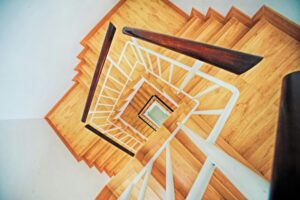If you’ve bought a shared ownership property you’re probably keen to own a greater share it, as quickly as possible. “Staircasing” is how you get there. Staircasing is the process of buying greater shares of your property, up to 100% if your lease will allow. So how does this work? How long will staircasing take and how much will it cost? We answer all the frequently-asked questions about staircasing to give you a simple guide to owning more of your home, bit by bit.
FAQs
What does staircasing mean?
Staircasing is the process of buying greater shares of a shared ownership property. Once you’ve owned it for a certain amount of time – stated in your lease but normally between one and two years – you will be able to buy more shares.
For example, if you own 25% of your home, you will pay rent on the other 75% of the property. Your first staircasing purchase could mean buying another 25% share (or ‘tranche’), meaning you would then own 50% and pay rent on the other 50%.
You could be able to continue this gradual process of buying more of your property, right up to 100% ownership, if your lease allows. However, some providers do not allow you to purchase more than a certain percentage of your property.

How soon can you staircase with shared ownership?
Usually, you can staircase your shared ownership property after you have owned it for period of time. This is often one or two years, but these terms will be laid out in your lease. For example, if you had owned your property for two years, you could then buy another 10% share, or ‘tranche’ of the property.
(2024 Update: Changes in staircasing practices mean that a lot of newer leases – 2021 onwards – do not have this requirement. I.e.: You can buy additional shares as soon as you can afford it.)
How long does staircasing take?
The process of staircasing would usually take between one and three months for you to buy an additional share of your property. The length of time it would take you to staircase your way to full ownership would depend on the terms of your lease and your ability to raise enough money to buy extra shares in your property.
The property is valued each time you apply to buy an extra share. As a result, the amount of money needed to buy shares can change according to the value of the property at the time.
Read more
What is the staircasing process?
Firstly, you’ll need to let your housing provider know that you want to staircase. Then an independent surveyor will value your property – either your housing provider will organise this or give you a list of approved surveyors you can contact.
Once you have a valuation, you will be able to see how much the share you want to buy will cost. So, if your property is valued at £400,000 and you wish to buy another 10% share, this will cost you £40,000 plus fees.
Once you have a valuation, this will usually only remain valid for three months. You need to complete the transaction within this time, otherwise you will need a new valuation to proceed.

How much does staircasing cost?
As well as the price of the share you wish to buy, there are additional costs to staircasing. These include the cost of the valuation survey, your conveyancing fees, any stamp duty payable and any fees for your new mortgage.
What are the benefits of staircasing?
The main benefits of staircasing are that you’ll pay less rent and you benefit more from the property appreciating in value. Once you’ve staircased up to 100% ownership, you also have a better choice of mortgages and are able to sell the property on the open market – as long as your lease allows.
Can I buy 100% of a shared ownership property?
Whether you can buy 100% of your shared ownership property will depend on the terms of your lease. Some housing providers will allow you to buy 100% of the property, while others will not.
Do you need a solicitor for staircasing transactions?
Staircasing counts as a property transaction. As such there are various legal considerations, so you would typically employ a conveyancing solicitor to handle your staircasing transactions.
Do you pay stamp duty on staircasing transactions?
If you buy additional shares in a Shared Ownership property after the initial transaction, you don’t pay any stamp duty until you pass the threshold of 80% ownership of the property. Once you surpass 80% ownership of the property, you’ll need to fill in a return and pay stamp duty on the transaction that took you over 80% ownership and any further transactions.
Can I buy 1% instalments in staircasing?
Since the rule changes to shared ownership brought in during April 2021, you can now purchase additional shares in your property at a minimum of 1%. It used to be a 10% minimum previously, but the government wanted to give shared owners greater flexibility.
However, bear in mind that this rule change only affects leases signed during or after April 2021. If your lease was signed before then, the 10% minimum will likely still apply.
Can I staircase with a mortgage?
One way to increase your stake in a shared ownership property is to staircase using your mortgage. You can do this by increasing the size of your mortgage when you come to renew your mortgage deal. This can be a cheaper way to staircase your property, as you avoid any early exit fees on your current mortgage deal.
Do I need a deposit to staircase on my shared ownership property?
You don’t need a deposit to start staircasing your shared ownership property. You can use the stake you already own in the property as your deposit when applying for your mortgage. If you have additional savings, you can also put these down as a deposit to help you buy an even bigger share.
Can I only staircase in 10% increments?

Under the original Shared Ownership scheme, it was only possible to staircase in increments of 10% or more. This means you would have to save significant amounts of money to be able to buy each staircased share of your home.
However, newer shared ownership leases allow buyers to staircase in increments of 5%, making it slightly more affordable and attainable for most buyers. Some leases post April 2021 also now allow staircasing transactions of 1%, though you need to check with your landlord if this applies to your lease agreement.
Is staircasing a good idea?
Shared ownership staircasing can be a very good idea if you can afford to put aside money for a slow climb towards full homeownership. If you don’t have enough to make a viable deposit on a traditional mortgage, staircasing via shared ownership is a useful way to chip away at the problem over time. This can be more effective in the long term, compared to simply renting while saving up for a deposit.
Will staircasing rules change in 2024?
At the time of writing (July 2024) there are no plans for the UK Government to change staircasing rules. However, after the watering down of the Leasehold and Freehold Reform Act which passed into law in May 2024, the incoming Labour Government has expressed a desire to look into shared ownership schemes again. This may prompt changes to staircasing to make the process easier and less restrictive.
However, the private sector has seen an opportunity in helping homeowners to staircase. One recently funded startup, Stairpay, claims that it wants to: “automate the entire shared ownership journey for both residents and housing associations – from initial purchase to staircasing and resales.” This would mean that residents in shared ownership homes would manage the process through the app.
HomeViews is the only independent review platform for residential developments in the UK. Prospective buyers and tenants use it to make an informed decision on where to live based on insights from carefully verified resident reviews. Part of Rightmove since February 2024, we’re working with developers, house builders, operators, housing associations and the Government to give residents a voice, recognise high performers and to help improve standards across the industry.



















